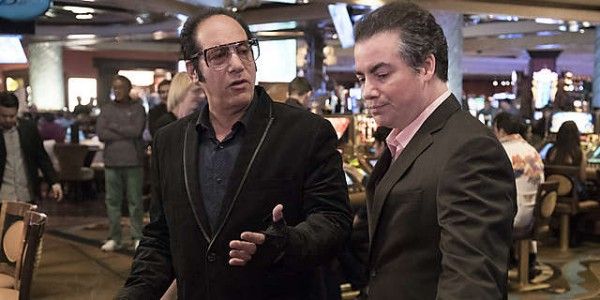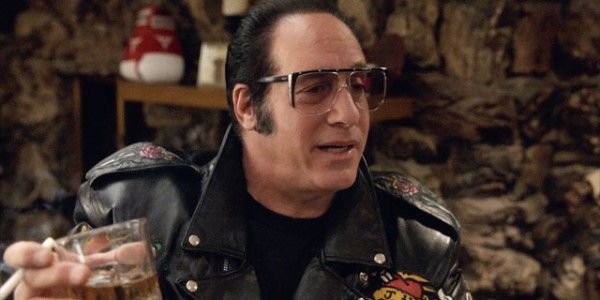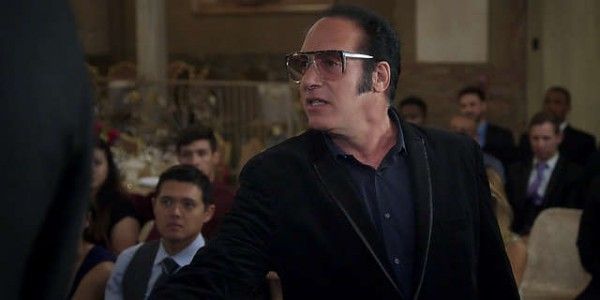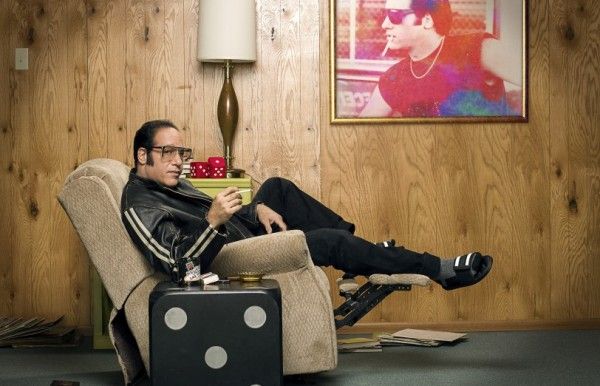With Dice, Showtime’s new comedy series, Andrew Dice Clay attempts to create a vision of himself as both a private citizen and as the creator and maintainer of the stand-up comedy persona that made him such a global phenomenon in the 1980s and 90s. This would seemingly be in loosely same mold as shows like Louie and Maron, which allowed Louis C.K. and Mark Maron to mine not only the lives of skilled performers but also their distinct philosophies and perspectives. Where those shows dealt with a chaotic life in the midst of a unique career in a creative field, however, Dice deals with the struggles of settling down, less in terms of romantically than as a celebrity and, to a lesser extent, an artist.
Much like New York City has proven to be a crucial setting and open canvas for C.K.’s imagination, Las Vegas seems to be the perfect reflective landscape for Dice Clay, whose jokes were often openly criticized for being misogynistic, sexist, and, in less cases, racist. Much like Times Square, Vegas is a perfect example of the white-washing of a city ruled by blue-collar crime – drugs, prostitution, etc. – in the name of consumerism and family-friendliness, which is so often the public face of white-collar crime. Similarly, Dice Clay’s brash, crass, and occasionally genuinely offensive brand of comedy is no longer acceptable in the current push toward more politically correct comedy. If there ever was a face of the old guard of popular comedy, it’s Andrew Dice Clay, and Dice seems to be connected directly to the feeling of being out of place in the new world of humor.
It’s not like Clay isn’t trying to move forward. While attending the wedding of his gilfriend’s, Carmen (Natasha Leggero), brother, he corrects a friend who refers to it as a “gay wedding” and says that it’s just a wedding. Though this clearly comes from a good place, the moment sticks out as a moment of forced sincerity amongst a tonnage of jokes, sarcasm, and skeptical observations; it feels like an insecure moment meant to reassure audiences that Clay isn’t homophobic. He certainly doesn’t seem to care about seeming sexist: in one of his infamous rants, he refers to a mid-Western wife as a valise, and another opening gag hinges on Clay being distracted by the ass of a neighbor lady doing yoga outside. These are certainly less troubling than the kind of language and tone that Clay took in his prime, but neither of these moments are particularly funny or even fit into what makes Clay so hilarious.
Clay’s frustrated delivery and knowledge of slang and language are what has always made him so distinctly humorous, and to be fair, there’re plenty of big laughs in Dice. Paired regularly with Kevin Corrigan, who plays his friend Milkshake, Clay’s disbelief at, and arguments with, the world and society at large suggest a man who is indeed attempting to grow with the times, but is also failing regularly. The key episode of the series involves the comedian getting desperate and upset while searching for a plaster molding of his penis, made by Cynthia Plaster Caster back in the height of his fame. It’s a perfect, expressive vision of what Clay’s fears and pains are in regaining his fading importance, a totem of his youthful vitality, celebrity status, and fiscal worth.
There are flashes of this same kind of inventive symbolism and self-criticism when he meets with Adrien Brody, who wants to learn about masculinity from Clay, who he perceives to be a master of the art. If Clay and the creative team behind Dice had followed these sorts of inclinations, Dice would have had the same galvanizing pulse as Louie, but the six-episode series is lacking that show’s intimacy as well. There’s a interesting scene where Clay attempts to turn Carmen on by playing up his Jewish heritage, a way of showing her an intimate side of him that he doesn’t allow to the public. What is missing from Dice is more of these scenes, more moments where its clear that Clay isn’t the alpha-male vulgarian that he’s been playing on stage and on screen for most of his career. There’s not enough challenging of his machismo, outside of the age-old routine of Carmen being the sensible one and he being the foolish male, but that hardly counts as a moment of genuine reflection on the comedian’s part.
In the opening credits of the series, images and footage of Clay in his salad days, with one of the last moments being Clay quoting James Cagney in White Heat by saying “top of the world, ma!” In Raoul Walsh's film, the moment is meant to be triumphant in an anti-authoritarian way, but is also, in fact, the last thing the character says before he dies. It’s clear that Clay means the former meaning, but there’s never a clear sign that he understands the latter, or at least recognizes that matter completely in Dice.
Dice airs on Sundays at 9:30 p.m. on Showtime.
★★★ - Funny & Fascinating...Up to a Point





